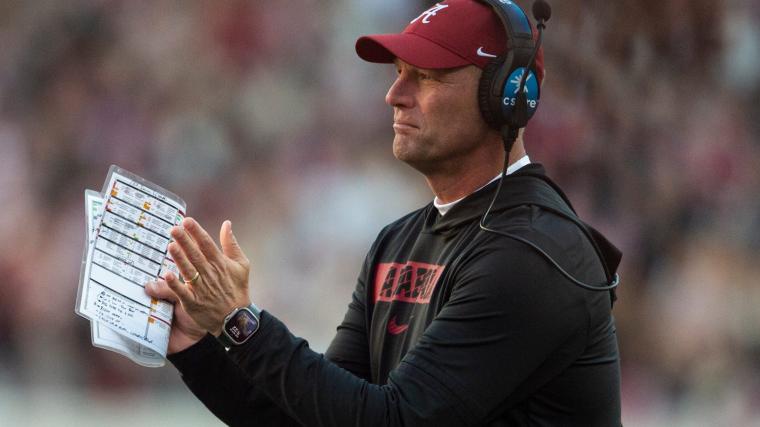To succeed in recruiting, Kalen DeBoer, the head football coach of the Crimson Tide, may still rely on Alabama’s reputation.

As college football enters a new era of recruiting, schools across the nation are realizing that recruiting success is not solely determined by an individual coach’s charisma or ability to sell a program. Instead, schools with the most sustained success, like Alabama, enjoy a major recruiting advantage because of their long-standing reputation, culture of excellence, and tradition of winning. With the arrival of Kalen DeBoer, the head football coach of the Crimson Tide, the importance of building on Alabama’s legacy and maximizing the program’s reputation remains a critical element for success in the highly competitive landscape of college football recruiting.
DeBoer’s entry into the Alabama program, as a new voice at the helm of one of the most prestigious football teams in the country, presents a unique dynamic in recruiting. While DeBoer has his own coaching style, ideas, and vision for the future, he will find that the Alabama brand has already done much of the heavy lifting when it comes to recruiting top-tier talent. The program’s history under legendary head coach Nick Saban has established Alabama as a perennial powerhouse with a track record of championships, NFL draft picks, and elite player development. This legacy is something that can significantly aid DeBoer in his efforts to recruit the best talent in the country.
In this article, we’ll examine the unique challenges DeBoer faces in leveraging Alabama’s reputation, how the program’s tradition can help him succeed, and what strategies he might use to build on that legacy while forging his path as the program’s new head coach.
1. Alabama’s Unmatched Recruiting Reputation
When a high school recruit considers the top programs in college football, there are a few key factors that weigh heavily in their decision-making process. The history of success and championship pedigree are at the top of the list, and no program has been more successful in this regard over the past decade than Alabama. Under Nick Saban, Alabama has established itself as the gold standard of college football, consistently competing for National Championships and producing a seemingly endless stream of NFL-caliber players.
Saban’s dominance in recruiting has set an incredible precedent. Over the years, Alabama has consistently landed top-ranked recruiting classes, with an emphasis on high-level talent, both from within the state and nationwide. The program’s success in landing some of the best recruits year after year has cemented its reputation as a destination school for players seeking to develop at the highest level and compete for championships.
The importance of this reputation cannot be overstated. When recruits from across the country consider where they want to play, they know that Alabama has produced a consistent pipeline to the NFL. For DeBoer, the Alabama brand will be his greatest asset as he works to continue the program’s success in recruiting. The name alone will open doors, making it easier for DeBoer to get his foot in the door with top prospects. But beyond that, Alabama’s reputation for winning and developing players into future NFL stars will provide him with an unparalleled platform to attract elite talent to Tuscaloosa.
2. DeBoer’s Challenge: Building His Identity While Relying on the Alabama Brand
While Alabama’s reputation undoubtedly makes DeBoer’s job easier in terms of attracting talent, he faces a unique challenge: how does he build his own identity as head coach while still relying on the powerful tradition that precedes him? The role of head coach at Alabama is different than coaching at other schools—there is an immediate expectation to win, and a new coach inherits a program that is already synonymous with success. For DeBoer, striking the right balance between leaning on Alabama’s established reputation and carving out his own identity as the face of the program will be critical for success in both recruiting and overall team development.
DeBoer’s coaching style and personal philosophy will need to resonate with players and potential recruits. While Alabama’s brand certainly has tremendous pulling power, recruits also want to know that the head coach has a clear vision and the ability to develop them into better players and future NFL prospects. As Saban’s successor, DeBoer has a huge task in continuing the work that has already been set in motion. Alabama recruits will want to understand how DeBoer’s coaching philosophy differs from Saban’s, and how his approach will help them grow as players while contributing to Alabama’s continued success on the field.
To succeed in recruiting, DeBoer must make it clear to recruits that he understands the Alabama culture, but he also offers something new—a fresh perspective on how to approach football at the highest level. He will need to demonstrate his ability to develop players and lead the program toward future championships while respecting the legacy of Alabama football.
3. The Alabama Culture: A Recruiting Tool
The culture at Alabama has been a significant factor in its recruiting success. Under Nick Saban, the program has fostered a no-nonsense, championship-focused atmosphere that has resonated with players. There is an understanding at Alabama that success isn’t just expected—it’s demanded. This culture has created an environment where only the most committed and driven players succeed, and it has produced an incredibly tight-knit program that pushes players to continually strive for excellence.
This culture of winning is something that DeBoer will naturally have to carry forward, as it is an essential part of the program’s appeal to recruits. Players want to know that they are joining a program with high standards—one where hard work and discipline are non-negotiable. The players who choose Alabama know they will be pushed to their limits in every facet of the game, whether it’s on the field, in the weight room, or in the classroom.
DeBoer will need to embrace and maintain this culture, as it is deeply ingrained in Alabama’s football program. However, it will also be important for him to bring his own philosophy to the table. How does he handle adversity? How does he build rapport with players while maintaining the high standards that Alabama is known for? These are questions that recruits will want answers to.
The key to success in recruiting will be maintaining the Alabama culture while also presenting a fresh face and voice for the program. If DeBoer can accomplish this, it will undoubtedly strengthen his ability to recruit top-tier talent, as players will want to be part of a program that is known for both its winning culture and its player-centric development.
4. The Transfer Portal and NIL: Modern Recruiting Tools
As DeBoer steps into the role of head coach at Alabama, he will also have to navigate the evolving landscape of college football recruiting, which includes the rise of the transfer portal and NIL (Name, Image, and Likeness) deals. Both of these factors have fundamentally changed the way recruiting works at the highest level, and Alabama will need to be at the forefront of these trends if it hopes to continue dominating the recruiting scene.
The transfer portal allows players to switch schools more easily, which creates both challenges and opportunities for Alabama. DeBoer will have to manage the balance between recruiting high school players and using the transfer portal to fill specific needs on the roster. Alabama’s reputation for developing NFL-caliber talent makes it an attractive destination for transfer players seeking to boost their draft stock, and DeBoer will need to leverage this.
Similarly, NIL deals have added another layer to the recruiting process, as high-profile recruits now have the potential to earn significant income while in college. Alabama is uniquely positioned to take advantage of this, given the program’s stature and visibility. DeBoer will need to ensure that Alabama remains competitive in NIL offerings, working with the athletic department, boosters, and other stakeholders to provide recruits with the financial opportunities they seek while still maintaining the program’s focus on player development and team success.
5. Maintaining Alabama’s National Recruiting Reach
One of the key strengths of Alabama’s recruiting is its ability to recruit nationally. While the Tide has historically been able to dominate in the state of Alabama and the broader Southeast region, Saban’s reach extended far beyond these traditional recruiting territories. Alabama has consistently landed top-tier talent from coast to coast, including players from California, Texas, and the Northeast, giving the program a national recruiting footprint that few programs can rival.
For DeBoer, it will be crucial to maintain this broad recruiting reach. He will need to continue Alabama’s emphasis on recruiting nationally, tapping into talent-rich areas that other programs might neglect. If DeBoer can sustain Alabama’s recruiting presence in these areas, while also continuing to dominate in the Southeast, the program will remain one of the most attractive destinations for top-tier talent.









